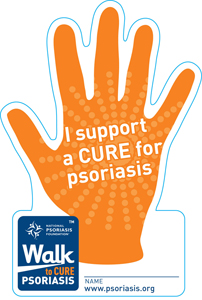Could You Have Psoriasis?
Do you have a rash that just won’t heal? Psoriasis might be the
culprit. This chronic skin disorder affecting close to 7.5 million people in the U.S. causes scaling and inflammation and may be a result of an abnormality in the body’s immune system.
Psoriasis usually presents itself in early adulthood but can occur later in life as well. Although potentially embarrassing to you especially if an outbreak is severe, it presents no threat to others because psoriasis is not contagious. It can, however, occur in members of the same family. Be sure and check with your doctor. Psoriasis can frequently be diagnosed through a simple physical examination.
Types of Psoriasis
Plaque psoriasis is the most common form. Reddish, round patches of affected skin appear with white scales. Occurs most frequently on the elbows, knees, scalp and trunk but can be anywhere.
Inverse psoriasis is the variety that tends to affect skin creases under the arms, in the groin or under the breasts. Patches tend to be smooth rather than scaly.
Pustular psoriasis is not as common but presents itself as red skin studded with pimples or small blisters.
Guttate psoriasis is when many small, red, scaly patches develop all at once. It is seen most often in a young person after a strep throat infection.
Erythrodermic psoriasis presents itself as extremely red skin resembling a sunburn over most of the body. Hospitalization is usually necessary as an individual is generally quite ill with this variety.
Psoriatic arthritis is a condition that approximately 10 to 30% of patients with psoriasis may go on to develop within 10 years of initial onset.
Additional Note: About 50% of people with skin symptoms of psoriasis also have fingernail abnormalities. Their nails are often thick and have small indentations known as pitting.
Treatment of Psoriasis
Unfortunately psoriasis is a chronic, long-term disorder. On the upside, symptoms may come and go. On the downside, there is no cure. Treatment depends on the type of psoriasis and the amount and location of affected skin. Doctors typically weigh the risks and benefits of each kind of treatment and may even switch them up at periodic intervals to maintain effectiveness and decrease side effects. Here’s a rundown of possibilities:
Topical treatments: including steroid creams, moisturizers to relieve dry skin, and coal tar which is available in lotions, shampoos and bath solutions.
Light therapy: use of ultraviolet light sometimes in combination with coal tar. A treatment called PUVA combines ultraviolet A light treatment with an oral medication.
Methotrexate: an oral drug for severe cases.
Retinoids: a class of drugs related to Vitamin A applied as a cream or gel. Also taken in pill form.
Immunosuppressants: used to treat moderate to severe psoriasis, these drugs work by suppressing the immune system
Biologic therapies: newer injectable drugs that are used when others have failed.
Walk For a Cure
At SBC, we’re committed to help raise funding for important research that could lead to better treatments for people with psoriasis and psoriatic arthritis. That’s why we support and are involved in the Walk to Cure Psoriasis taking place in LA on April 26. Won’t you join us?
Click the link below to view all the info and sign-up with us! When you register, be sure to select “Join an existing team” and “Skin & Beauty Center” from the options shown under Local Companies!
We look forward to seeing you there!

